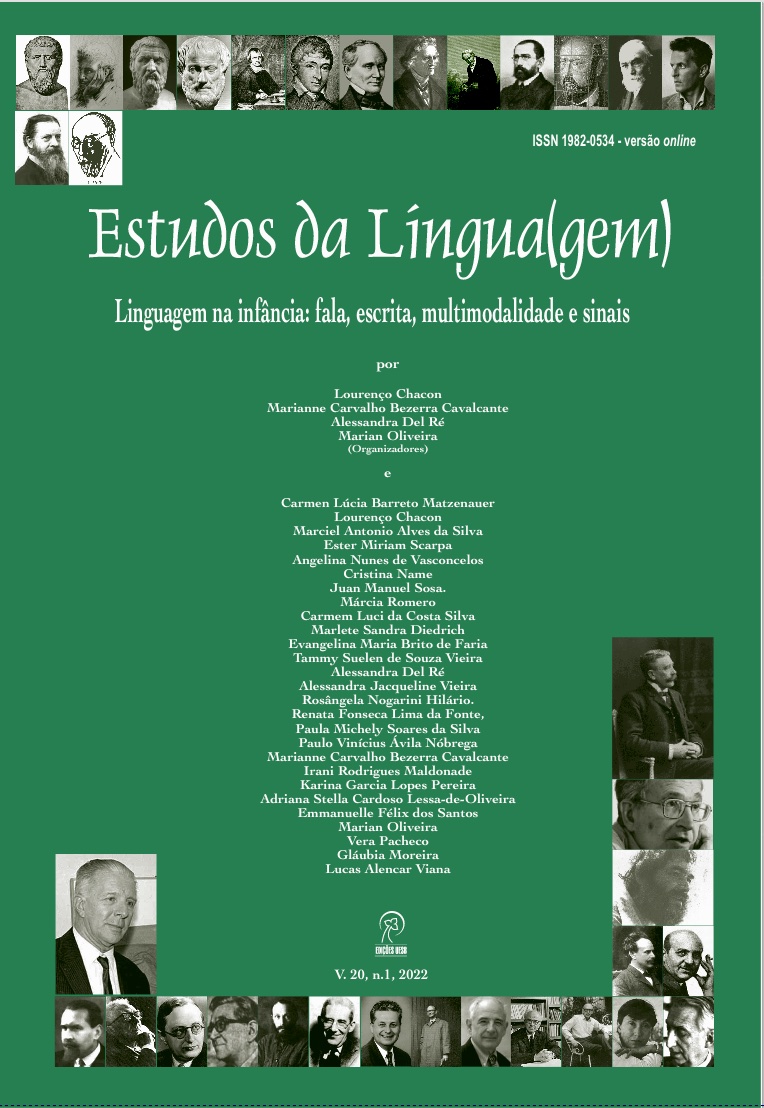Acquisition of the present indicative in Brazilian Portuguese according to the Theory of Enunciative Operations: a preliminary study
DOI:
https://doi.org/10.22481/el.v20i1.12068Keywords:
Acquisition of verb tense; Semantic study; Grammatical description.Abstract
This work is a preliminary study about the semantic value acquired by the present indicative (PRES) in the speech of a Brazilian child, drawing on the analysis of two recording sessions (GUS 2;0 and 2;4) made in a naturalistic setting. Based on the Theory of Enunciative Operations and on the hypotheses derived from the analysis, we aim at discussing the semantic and enunciative role of PRES by comparing its uses to those of the Preterite Perfect Indicative by the child on the same sessions. Current results suggest that the usual description of PRES in Portuguese.
Downloads
References
CORÔA, M. L. M. S. O tempo nos verbos do português: uma introdução à sua interpretação semântica. São Paulo: Parábola, 2005.
CULIOLI, A. Pour une linguistique de lʼénonciation: opérations et représentations. Paris : Ophrys, 1990.
CULIOLI, A. Pour une linguistique de lʼénonciation: formalisation et opérations de repérage. Paris : Ophrys, 1999a.
CULIOLI, A. Pour une linguistique de lʼénonciation: domaine notionnel. Paris : Ophrys, 1999b.
CULIOLI, A. Pour une linguistique de l’énonciation: tours et détours. Limoges : Lambert Lucas, 2018.
CUNHA, C.; CINTRA, L. Nova gramática do português contemporâneo, 2ª ed., Rio de Janeiro: Nova Fronteira, 1985.
DE VOGÜÉ, S. Invariance culiolienne: l’exemple du passé, entre passés, parfaits et passages. In: DUCARD, D.; NORMAND, C (Dir.). Antoine Culioli: un homme dans le langage. Paris : Ophrys, 2006. p. 302-331.
DEL RÉ, A. et al. O corpus NALINGUA e as tecnologias de apoio: a constituição de um banco de dados de fala de crianças no Brasil, Artefactum, ano VIII, nº 2, 2016.
ILARI, R.; BASSO, R. O verbo. In. ILARI, R.; NEVES, M. H. M. N. (Org.) Gramática do português culto falado no Brasil: classe de palavras e processos de construção. Campinas, SP: Ed. da Unicamp, 2008, p. 163-365.
PAILLARD, D. Temps, aspect, types de procès : à propos du présent simple. In. MILNER, J.-C. Recherches nouvelles sur le langage. Collection ERA 642, Paris: Université Paris 7, 1988, p. 92-107.
ROMERO, M. Sobre as operações enunciativas em títulos de textos jornalísticos: fundamentos para a análise de marcas temporais. In. TAGÉ, T. (Org.) Sensibilidades configuradas: estudos sobre comunicação, mídia e produção de sentido. São Paulo: Miró Editorial, 2009, p. 122-133.
ROMERO, M. Étude des phénomènes morphosyntaxiques, sémantiques et discursifs liés à l’acquisition du temps verbal pretérito perfeito simples en portugais brésilien. Cahiers de praxématiques. nº 70, 2018, p. 1-15.
ROMERO, M. Teoria das Operações Enunciativas. In: ROMERO, M. et al. Manual de Linguística: Semântica, Pragmática e Enunciação. Rio de Janeiro: Vozes, 2019, p. 175 228.
ROMERO M. « Partiu! » en portugais brésilien: contribution à l’étude du processus de créativité linguistique. In: RAINERI, S. et al. (Dir.) La correction en langue(s). Linguistic correction/Correctness. Paris: PU Paris Nanterre, 2020, p. 177-191.
ROMERO, M. La représentation métalinguistique de l’alternance causative-ergative en portugais brésilien : hypothèses descriptives. In : DUFAYE, L. ; GOURNAY, L. (Dir.) Métalinguistique et épilinguistique en linguistique énonciative. Actes du Colloque (no prelo).
ROMERO-LOPES, M. C. Estudo semântico do pretérito perfeito: variações interpretativas e regularidades de funcionamento. In. REZENDE, L. M.; ONOFRE, M. B. (org.) Linguagem e línguas naturais - diversidade experiencial e linguística. São Carlos: Pedro & João Ed., 2006, p. 23-39.
Downloads
Published
How to Cite
Issue
Section
License

This work is licensed under a Creative Commons Attribution 4.0 International License.

Estudos da Língua(gem) is licensed under a Creative Commons Attribution 4.0 International License.
Authors who publish in the journal Estudos da Língua (gem) agree with the following terms:
The journal Estudos de Língua(gem) maintains the copyrights of the contributions published. These rights include the publication of the contribution and make its content available for free through the portal.







